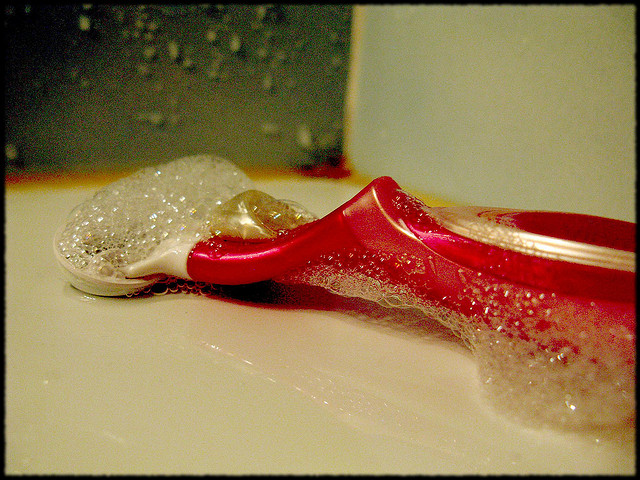There are so many mundane tasks in the world, to do them all unconsciously is an acute waste of potentially useful time—time to reflect, time to create and time to be with ourselves and know ourselves more.
So every week, on Sundays, I turn my bathroom into a spa—and shaving my legs into an ordeal.
I read a book once, written by a Buddhist monk who spoke of how different our experiences can be simply by altering our thoughts about the experience.
His example was washing the dishes. He said washing dishes, mundane task that it is, could be meditative—life-changing even—if we watch our thoughts, and if we take the time to feel our hands as they hold the plates or submerge our fingers beneath suds of soap.
I thought: I need to try this.
I lived with my uncle at the time, and instead going down a list of complaints questioning why he’s home all day and cannot do the dishes, I thought about all the other things he’s done for me on a daily basis. I thought about the food he cooks and the company we share over a meal. As I did the dishes, I felt my hands as they held the plates, swam under the water and carried bubbles of soap through the air.
Doing this with every task every day feels unrealistic, as if I’m setting myself up for failure—but scheduling it into my week creates a habit I have come to embrace. So now, once a week, I look forward to shaving my legs. It has become my thing.
It takes 20 minutes, and it’s a little ridiculous. I’ll surface clean first—putting up the contact cases, the lotion bottles and closing the toothpaste cap. Then I’ll light a candle and turn on the heat.
I turn off the obnoxiously bright mirror lights and just leave the dim overhead lights. I put on some calming music and draw the warm bathwater just enough to cover my ankles and add a cup of bath salt. I create a sacred space for myself. I lock the door behind me, place my robe in easy reach, and I set the intention to truly honor myself.
I do this because I spent the greater part of two decades hating my body, not taking care of myself, giving too much of myself without nurturing myself and being so disconnected from my physical body, the only thing able to bring me back into it was physical pain.
Society encourages this—this ignorance and denial of the gifts our bodies offer, such as presence, pleasure, mobility and health. We are conditioned to be against our own bodies—angry even—when the hard truth is that our bodies are simply reacting to our choices. Our bodies do the best they can to maintain balance and good health, drawing from the amount of care we put in ourselves.
These days, as a symbolic gesture of appreciation, I sit on the side of my tub, and—with each delicate stroke of the razor—I notice and acknowledge the small things. My thoughts. My breath. I feel the ceramic tub under my seat and the warm water around my toes. I feel my body—connecting to it in a way that negates this societal quandary. The world is quiet around me, and I find gratitude in the thoughts that enter and leave. This becomes my time to reconnect with myself.
I can choose to do this task begrudgingly—I can choose to do anything begrudgingly—but I’ve learned that the intention I walk into a situation with directly effects my experience.
Whether it’s a workout, a work day, a project, a relationship, a conversation or any life experience in between—I can be open to the idea, that perhaps there is room for a deeper, more meaningful and more positive reality.
So every Sunday, I take those 20 minutes to re-train and remind myself that anything in my life, however mundane, can be an opportunity to make a difference—to reconnect, to know myself more and to become a better human.
Moments like these lay the foundation on which we can go out into the world and live our lives upon. It’s important to have these moments—to embrace them and change the way we view the small things, so we can allow the bigger things to become easier too.
The choice is ours—each and every day—as to how we will embark on a given task or situation.
.
Author: Dottie Hollingsworth
Apprentice Editor: Debbi Serafinchon/Editor: Yoli Ramazzina
Photo: Flickr/worak











Read 0 comments and reply